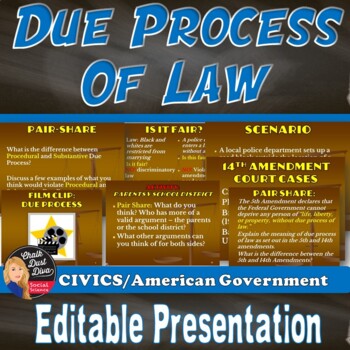

That content includes the definition of proper aims for state activity, the canons of legitimating participation and consent, and the conceptions of human personality that set the threshold of respectful treatment. It is from the liberal individualist tradition that these abstract due process standards-of reason, voice, and dignity-have drawn their more concrete content.

Very broadly, it has come to mean decisions that are not arbitrary, but are aligned with publicly accepted aims and values are not dictatorial, but allow affected persons a suitable part in their making and are not oppressive, but treat those affected with the respect owed political associates and fellow human beings. In modern usage "due process" connotes a certain normative ideal for decisions about the exercise of power. The question of according due process arises when governments assert themselves adversely to the interests of individuals.


It is a traditional legal expression of concern for the fate of persons in the presence of organized social power. Defense practitioners should ensure that they scrutinize these claims from the outset of litigation as doing so can result in dismissal of this claim.The Fifth Amendment forbids the United States to "deprive" any person of "life, liberty, or property without dueprocess of law." The fourteenth amendment imposes an identical prohibition on the states.ĭue process is the ancient core of constitutionalism. Procedural due process claims are rife with potential pitfalls for plaintiffs. Where such factual allegations are missing, the pleading is deficient. Allegations of a deprivation of property must clearly set forth facts that support a claim of entitlement to the alleged property interest. He must, instead, have a legitimate claim of entitlement to it.” Id. “To have a property interest in a benefit, a person clearly must have more than an abstract need or desire for it. Property interests “are created and their dimensions are defined by existing rules or understandings that stem from an independent source such as state law-rules or understandings that secure certain benefits and that support claims of entitlement to those benefits.” Bd. Therefore, in such situations defense practitioners would be well-served by filing a dispositive motion at the initial stages of litigation to dismiss a procedural due process claim.įinally, litigants asserting a deprivation of a property interest often fail to properly assert a claim that can survive motion practice. If a complaint does not specify how remedial procedures were constitutionally inadequate, that complaint is deficient if it seeks relief for a procedural due process violation under the Fourteenth Amendment. Litigants fail to focus on issues such as a lack of notice or of a proper hearing, and instead focus claims on the underlying unconstitutional harm they suffered. However, plaintiffs often fail to adequately assert facts that deak with the procedures used to remedy an alleged constitutional deprivation. The focus is on the remedial process, not the government’s actions that allegedly deprived the plaintiff of his liberty or property interest. “At the core of procedural due process jurisprudence is the right to advance notice of significant deprivations of liberty or property and to a meaningful opportunity to be heard.” Abbott v. In order to successfully establish a prima facie case for a procedural due process violation, a plaintiff must show that: (1) there has been a deprivation of the plaintiff’s liberty or property, and (2) the procedures used by the government to remedy the deprivation were constitutionally inadequate. Such claims are improper and should be dismissed.įurthermore, procedural due process claims should be dismissed at the beginning of a lawsuit when a complaint fails to allege facts that deal with the inadequacy of post-deprivation procedures. Plaintiffs often assert due process claims under the Fifth Amendment despite the lack of any allegation related to the federal government. Although these two Constitutional Amendments safeguard this right, it is well established that the Fifth Amendment applies only to actions taken by the federal government. Defense practitioners should be on alert when dealing with a due process claim and should be aware of common mistakes plaintiffs make when they assert this claim.ĭue process rights are protected by both the Fifth and Fourteenth Amendments of the United States Constitution. Defending Against a Procedural Due Process Claim? Think Dismissal.A claim for violations of a person’s procedural due process rights is a constitutional claim often misunderstood and improperly pleaded.


 0 kommentar(er)
0 kommentar(er)
